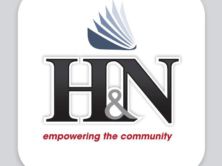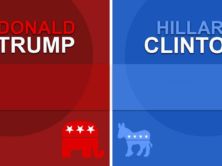Dominique Strauss-Kahn (right) and his attorney (left) appear in court over charges of sexual assault against Strauss-Kahn. (Credit: YouTube, RTAmerica, screenshot)
While the U.S. media determines what and how much to reveal in reporting on Arnold Schwarzenegger’s affair and its resultant child, the differences between the American and French media coverage of the charges against former International Monetary Fund head Dominique Strauss-Kahn have come to light.
Global Post described the case as an example of “the chasm between how France and America handle men, women and rape.”
The French “elite” has reportedly criticized the American media for showing images and footage of Strauss-Kahn in handcuffs, whereas the French media has named the alleged victim — a no-no in U.S. journalism ethics, according to Global Post.
The New York Times’ City Room blog noted that French media have equally been covering the allegations against Strauss-Kahn and the American media’s reporting on the case.
Fake Photos?
Global Post also noted that a variety of fake photos purported to be the woman accuser have been floating around online. “No doubt, it’s a drama for the women depicted, and a moment of journalistic shame for certain French publications who succumbed to the temptation to publish without verifying first.”
One of the fake photos is that of a New York real estate agent with the same name.
Ethics Codes
The U.S. Society of Professional Journalists’ ethics code, advises:
- “Recognize that private people have a greater right to control information about themselves than do public officials and others who seek power, influence or attention. Only an overriding public need can justify intrusion into anyone’s privacy.
- “Show good taste. Avoid pandering to lurid curiosity.
- “Be cautious about identifying juvenile suspects or victims of sex crimes.
- “Be judicious about naming criminal suspects before the formal filing of charges.
- “Balance a criminal suspect’s fair trial rights with the public’s right to be informed.”
French Laws
The Wall Street Journal reported that France’s “broadcasting watchdog,” the Higher Audiovisual Council, advised “restraint” in French TV’s reporting on the Strauss-Kahn case, specifically when it comes to airing Strauss-Kahn in handcuffs.
A 2000 French law, according to the Journal, bans “images of people in handcuffs, or otherwise restrained, until they have been convicted by a court.” If broken by media, the maximum fine is a little more than $20,000. The law is supposed to help maintain “presumption of innocence.”
The Wall Street Journal reported that Higher Audiovisual Council board member, Rachid Arhab, claims the law includes images taken abroad; however, a council spokesperson reportedly told the Journal that “the individual, not the agency,” will be left to enforce the ban of these images.
Naming the Alleged Victim
Some French media outlets like Paris Match and Le Figaro have named the woman accusing Dominique Strauss-Kahn. Le Figaro, for example, provided names and ages for both the woman and her daughter along with descriptions of the woman. Notably, Le Figaro’s headline names the woman with the qualifier “the victim of the faceless DSK affair.”
Gawker-owned blog Jezebel noted that French media has reported “a variety of personal details” about the woman and rating her “attractiveness.” For example, according to Jezebel, Paris Match reported that Strauss-Kahn’s lawyers described the woman as “very unattractive,” a taxi driver said the woman has “big boobs and beautiful buttocks,” and that another person called her “very pretty.”
According to Global Post, Paris Match does mention that U.S. journalists aren’t naming the woman “to ensure her security and privacy.” Paris Match reports personal descriptions about the woman from “a friend” and includes both “a sympathetic profile” of the woman and “the prurient” descriptions of the woman.
Global Post reported that Le Monde “published both versions of the woman’s name, Guinean and American, in a 1,000-word profile titled ‘[first name withheld], victim without a face.'”
The Telegraph reported comments from the woman’s brother and the man who runs her building’s tenants’ association.
The New York Times reported an interview with an unnamed African immigrant neighbor of the woman describing her and her daughter as “good people,” “never given a problem,” and “never noisy.” The Times also reported an interview with an unnamed coworker maid at the hotel who called her a “good person” and “friendly.”
Poynter’s Mallary Jean Tenore noted that The Atlantic’s Jeffrey Goldberg called the New York Times’ reporting on the woman’s “character” information that is “completely immaterial.”
The Atlantic’s Goldberg questioned what “the point” is of reporting on the woman accuser’s personality:
“Rape is rape. The character of the victim is irrelevant. There’s one caveat to this idea: If reporters had discovered in the woman’s past a pattern of making false accusations in criminal matters, well, then there’s a plausible argument that information about her character should be reported.”
Goldberg also noted that by investigating and interviewing in the alleged victim’s home area, journalists end up “publicize, in the place where she lives, her plight, and raise possibly-destructive questions about her situation.”
Poynter’s Tenore also reported that Poynter’s Julie Moos noted “by virtue of the accusation, we protect the accuser, though we do name the accused.” Moos reportedly went on to question cases where there may not be a victim, like the John Edwards-Rielle Hunter affair.
For example, the naming of the woman involved in the Schwarzenegger affair has been debated and handled in a variety of ways because it appears the relationship was consensual.






Comments Terms and Conditions